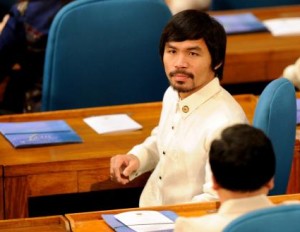
|
Philippines, 28 Jan 2026 |
Home >> News |
 |
||||
|
|
|
|
PACQUIAO AND POLITICS (PART II) By Maloney L. Samaco PhilBoxing.com Thu, 08 Oct 2015  Congressman Manny Pacquiao is now serving his second term as representative of the lone district of Sarangani, a province with a 45% poverty rate, located in the country?s tuna capital. He acted as vice chairman of three committees for the majority, namely: Millennium Development Goals, Poverty Alleviation, and Youth and Sports Development. Professor Prospero de Vera said when Pacquiao was absent mostly to train he was denying representation for his constituents in his district. "He has a problem understanding what representation means," said de Vera as quoted by the Associated Press. "What is worrisome is that he doesn't seem to be bothered by it." But Pacquiao's supporters insisted that while the fighting congressman was busy training and boxing to give honor to his country, he was able to serve his constituents by giving assistance for their livelihood such as fishing boats, carabaos, lots for housing and college scholarships through his wife Vice Governor Jinkee Pacquiao. Sometimes doling out funds from his own pocket. Critics called these dole outs as acts by traditional politicians or "trapos" which Pacquiao practiced in his district. Political analyst Ramon Casiple warned that "Pacquiao should be aware of people around him who are not only 'trapo' but also opportunists, who will take advantage of his name and his money." But in Philippine politics, people are not so concerned with what their representative has done in the halls of Congress but how many school buildings, irrigation projects, farm-to-market roads and multi-purpose centers a representative has funded and brought to his district. The Filipino electorate preferred public officials who listened to their problems, provide them with their basic needs and who are ready to sympathize with them in times of distress. Many political experts suggest that Pacquiao should run as governor or mayor because his style of public service is likened to that of a local chief executive. But the average electorate could not distinguish the functions of an executive and a legislator. For them it does not matter whether the official makes laws or executes the laws. As long as the official understand the plight of the masses and is identified with them, then they would love him. At the height of the so-called "Cory magic" Joseph Estrada, then former San Juan mayor, found his strength in the votes of the masses and it was only he and Juan Ponce Enrile, then former defense minister, who won seats under the Grand Alliance for Democracy, a party who opposed then President Corazon Aquino. GAD won only two seats of the 24 Senate slots contested during the first national legislative elections after EDSA Revolution, the other 22 Senators were from President Aquino's party Lakas ng Bayan. Highly criticized as not qualified to be a Senator for being a college dropout, Estrada principally authored bills on irrigation project and the protection and propagation of carabaos, among others. In 1989, the Free Press cited Estrada as one of the Three Outstanding Senators of the Year. The next national elections in 1992, Estrada won as Vice President with the support of the masses which constitute a vast majority of the electorate. His being a famous and multi-awarded action star provided the popularity needed to boast his candidacy. Apparently, Pacquiao follows the same path with the same mass appeal as the former president. The people who appreciated their style of service constitute more than half of the voting population. Click here to view a list of other articles written by Maloney L. Samaco. |
|
|
PhilBoxing.com has been created to support every aspiring Filipino boxer and the Philippine boxing scene in general. Please send comments to feedback@philboxing.com |
PRIVATE POLICY | LEGAL DISCLAIMER
developed and maintained by dong secuya © 2026 philboxing.com. |